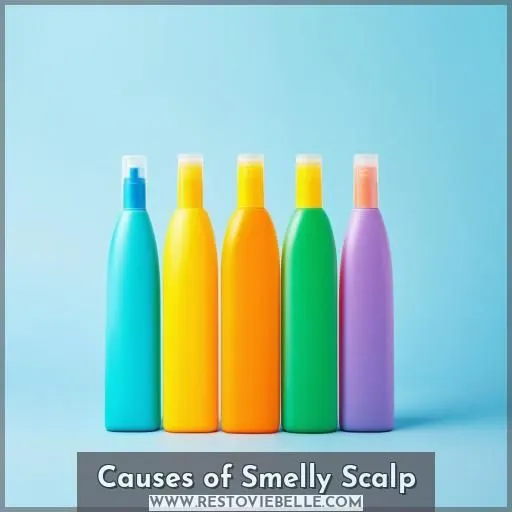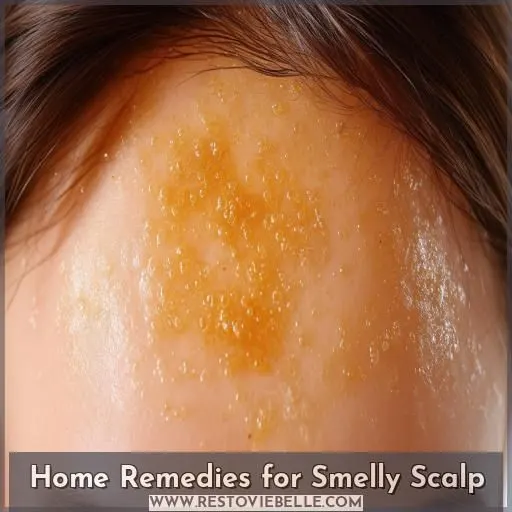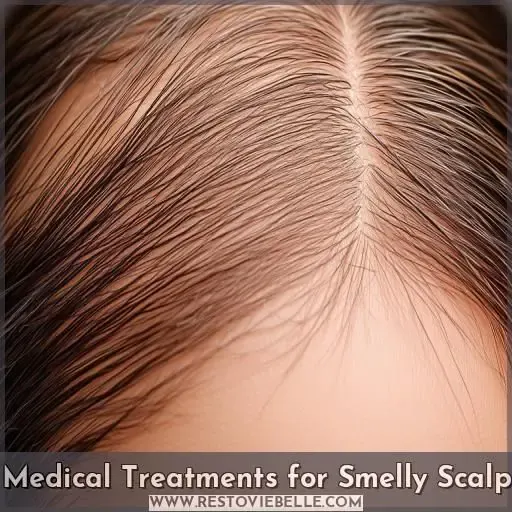This site is supported by our readers. We may earn a commission, at no cost to you, if you purchase through links.
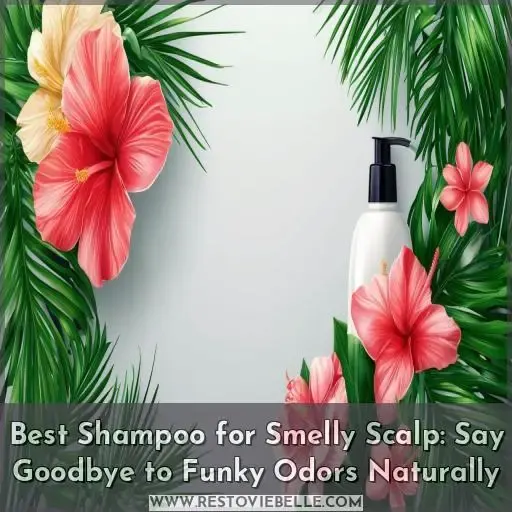 Can’t seem to shake that funky scalp odor? You’ll want to grab one of the best shampoos for smelly scalp.
Can’t seem to shake that funky scalp odor? You’ll want to grab one of the best shampoos for smelly scalp.
Tea tree oil-infused options like OGX Scalp Tea Tree Peppermint are fantastic for nixing nasty scents with their antifungal power.
For oily hair types, a deep cleansing, sulfate-free pick like Videri’s shampoo blasts away buildup.
If natural ingredients are a must, check out Degrease or Ryo’s plant-based smelly scalp shampoos.
Ready to breathe easy with a fresh, clean mane? Let’s keep going to explore more surefire solutions.
Table Of Contents
- Key Takeaways
- 5 Best Shampoos for Smelly Scalp
- Causes of Smelly Scalp
- Home Remedies for Smelly Scalp
- Medical Treatments for Smelly Scalp
- When to See a Healthcare Provider
- Frequently Asked Questions (FAQs)
- Which shampoo is good for smelly scalp?
- How do I stop my scalp from smelling smelling?
- What fungus causes smelly scalp?
- How to do scalp detox?
- What are the best shampoo fragrance types for smelly scalp?
- Can diet impact the odor of the scalp?
- Are there side effects of using dandruff shampoos for smelly scalp?
- How does pollution contribute to a smelly scalp?
- What ingredients should be avoided in shampoos for a smelly scalp?
- Conclusion
Key Takeaways
- Shampoos infused with natural ingredients like tea tree oil, peppermint, and rosemary pack a powerful punch against funky scalp odors – think of them as nature’s deodorizing superheroes!
- If home remedies like apple cider vinegar rinses and coconut oil massages aren’t cutting it, it might be time to call in the big guns: medicated shampoos with active ingredients like ketoconazole and zinc pyrithione. These tough guys don’t mess around when it comes to banishing bacteria and fungus.
- Don’t underestimate the power of diet and lifestyle! A balanced diet and improved hygiene practices can work wonders in keeping your scalp smelling as fresh as a daisy. After all, a happy scalp is a sweet-smelling scalp.
- When all else fails, it’s okay to seek professional help. A dermatologist or trichologist can diagnose the root cause of your smelly scalp woes and prescribe the appropriate treatment, whether it’s oral medication or a targeted topical solution. Sometimes, a little expert guidance is all it takes to nip that funk in the bud.
5 Best Shampoos for Smelly Scalp
Are you tired of dealing with an unpleasant scalp odor? Shampoos like Videri Sulfate Free Oily Hair Shampoo, OGX Scalp Tea Tree Peppermint, Degrease Shampoo Oily Hair, Ryo Hair Strength Expert Oily Scalp Shampoo, and Biolage Cooling Mint Scalp Shampoo can effectively combat funky smells by regulating oil production, eliminating buildup, and promoting a healthy scalp environment.
1. Videri Sulfate Free Oily Hair Shampoo
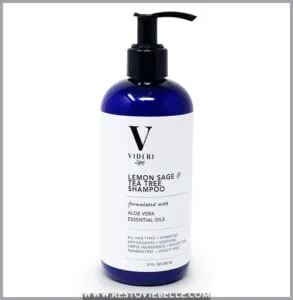
Videri’s Sulfate Free Oily Hair Shampoo is a game-changer for those battling smelly scalp.
Infused with organic aloe vera, glycerin, and essential oils, this shampoo deeply cleanses while nourishing your hair and scalp.
The invigorating lemon sage and tea tree scent leaves your locks feeling revitalized.
Hydrolyzed wheat protein, provitamin B5, chamomile, and lavender distillates work together to soothe and moisturize your scalp.
Sulfate, paraben, and cruelty-free, this shampoo is made in the USA with high manufacturing standards.
Say goodbye to funky odors and hello to a healthy, happy scalp with Videri.
Best For: Oily scalp
- Deeply cleanses and nourishes hair and scalp
- Invigorating lemon sage and tea tree scent
- Sulfate, paraben, and cruelty-free
- May dissolve keratin treatments
- Suspicious label sticker
- Customer satisfaction may vary
2. OGX Scalp Tea Tree Peppermint
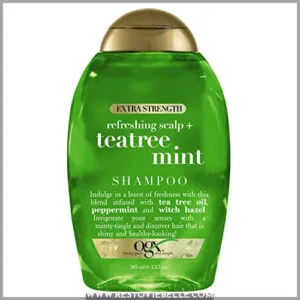
The OGX Scalp Tea Tree Peppermint shampoo is a sulfate-free formula with a 13 fl oz bottle.
It is designed to effectively remove scalp buildup without stripping the hair.
It contains tea tree oil, peppermint extract, and witch hazel, providing deep cleansing, invigoration, and nourishment.
The invigorating scent includes notes of sweet peppermint, iced vanilla, and tea tree, leaving the hair shiny, soft, and hydrated.
This shampoo is suitable for all moisture types.
It is intended for use in conjunction with the Extra Strength Teatree Mint Shampoo & Conditioner for satisfactory results (Source).
Best For: Those looking for a deep cleansing shampoo that removes scalp buildup without stripping hair.
- Removes scalp buildup without stripping hair
- Infused with tea tree oil, peppermint extract, and witch hazel
- Leaves hair shiny, soft, and hydrated
- May not be suitable for all hair types
- Scent may be too strong for some
- For optimal results, use with Extra Strength Teatree Mint Shampoo & Conditioner
3. Degrease Shampoo Oily Hair
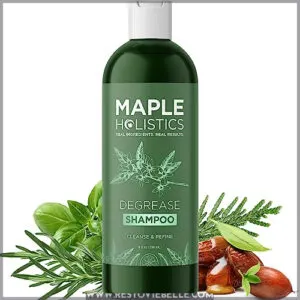
Degrease Shampoo Oily Hair is a game-changer for those struggling with extremely oily hair and scalp.
Its degrease formula, infused with natural ingredients like rosemary oil, cypress basil, and lemon oils, effectively tackles oily hair concerns while being sulfate and paraben-free.
Safe for color-treated hair, this 8-ounce liquid shampoo cleanses the scalp and hair, leaving them clean, shiny, and oil-free for multiple days.
However, some users reported issues with packaging and hair fall. For best results, pair it with a clarifying shampoo to combat flaking and an itchy scalp.
Best For: Those with extremely oily hair and scalp.
- Effectively tackles oily hair concerns
- Cleanses scalp and hair, leaving them clean and oil-free
- Safe for color-treated hair
- Some reported issues with packaging
- May cause hair fall for some users
- Requires pairing with a clarifying shampoo to combat flaking and itchy scalp
4. Ryo Hair Strength Expert Oily Scalp Shampoo
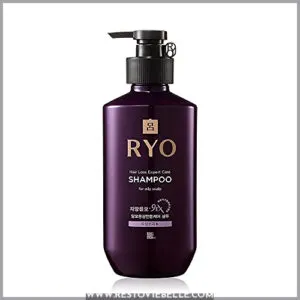
Ryo Hair Strength Expert Oily Scalp Shampoo is a game-changer for those struggling with a smelly, oily scalp.
Formulated with ginseng extract, this shampoo packs a powerful punch against excess sebum and odor-causing bacteria.
The rich, cooling foam cleanses deeply while leaving your scalp feeling refreshed and invigorated.
With 47 years of scalp research behind it, this plant-based formula is free of harsh chemicals and animal-derived ingredients.
Say goodbye to greasy roots and hello to a healthier, happier scalp with Ryo’s expert touch.
Best For: Individuals with oily scalp looking to reduce excess sebum and odor.
- Deeply cleanses and removes excess oil
- Cooling foam refreshes and soothes the scalp
- Formulated with natural ginseng extract
- Scent may not be universally appealing
- May require importation taxes
- Some users may experience hair loss
5. Biolage Cooling Mint Scalp Shampoo
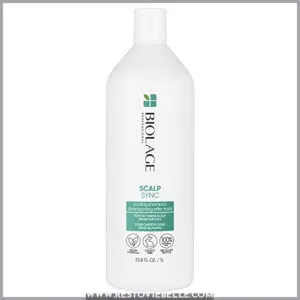
Biolage’s Cooling Mint Scalp Shampoo is a deep cleansing powerhouse that revives and relieves irritated, oily scalps.
Formulated with invigorating mint leaf, it provides a cooling sensation while absorbing excess oil and buildup. This professional salon product strengthens hair and leaves your scalp balanced and clean.
Simply apply to wet hair, massage into a lather, and rinse. For enhanced cooling, use with the Scalp Sync Conditioner.
Suitable for all hair types, this shampoo is a game-changer for those battling greasy locks and an irritated scalp. Bid farewell to funky odors and hello to a healthier, happier head of hair.
Best For: Those with oily, irritated scalps.
- Deeply cleanses and relieves irritation
- Refreshing mint leaf formula
- Strengthens hair
- Expensive
- May not completely cure winter oiliness for some users
- Made in China
Causes of Smelly Scalp
A smelly scalp can stem from medical conditions like dandruff, fungal infections, hormonal changes, or hyperhidrosis, which causes excessive sweating. However, non-medical factors such as poor hygiene, an unhealthy diet, pollution exposure, and residue buildup from hair products can also contribute to an unpleasant scalp odor.
Medical Causes
Medical Causes of a smelly scalp involve various conditions:
- Scalp Psoriasis causing inflammation and skin cell overgrowth.
- Fungal Infections leading to persistent odor due to fungal activity.
- Hormonal Changes and Hyperhidrosis increasing sweat production and providing a suitable environment for bacteria, yeast, and fungus to thrive, contributing to scalp odor.
Non-Medical Causes
Non-medical causes of smelly scalp include poor hygiene, pollution, diet, and residue from hair products. Sweating can also contribute to an unpleasant odor. Improve hygiene by washing hair more frequently and using clarifying shampoos. Natural remedies like apple cider vinegar and tea tree oil may help reduce fungal growth and dandruff. Consult a healthcare provider if symptoms persist.
Home Remedies for Smelly Scalp
You can try improving your scalp’s hygiene by washing your hair more frequently with clarifying shampoos that remove excess oil and product buildup. Natural remedies like coconut oil, tea tree oil, aloe vera, and apple cider vinegar have antibacterial, antifungal, and anti-inflammatory properties that may help reduce scalp odor.
Improved Hygiene Practices
Improve your hair hygiene to banish smelly scalp.
Wash hair more often with a clarifying shampoo to remove buildup.
Rinse with apple cider vinegar to balance pH and reduce odor-causing bacteria.
Use tea tree oil shampoo to fight fungus and soothe irritation.
Massage coconut oil into the scalp before washing to nourish and deodorize.
Aloe vera gel can also calm inflammation and inhibit bacterial growth.
Natural Remedies
Embrace the power of nature to banish scalp odor!
Coconut oil’s antifungal properties reduce fungi while increasing beneficial bacteria (Source).
Tea tree oil’s antifungal and anti-dandruff effects soothe the scalp .
Aloe vera’s antibacterial and anti-inflammatory benefits calm irritation .
Apple cider vinegar’s antifungal properties and ability to reduce dandruff make it a fresh, natural remedy.
Harness the best of nature for a healthy, odor-free scalp!
Medical Treatments for Smelly Scalp
If home remedies don’t alleviate your smelly scalp, you may need to explore medical treatments.
Several over-the-counter shampoos specifically target dandruff, fungal infections, and other scalp conditions that can lead to odors.
For example, dandruff shampoos containing zinc pyrithione or ketoconazole inhibit fungal growth.
While psoriasis shampoos with ingredients like clobetasol propionate or salicylic acid reduce inflammation and facilitate shedding of dead skin cells.
Dandruff Shampoos
Dandruff shampoos contain active ingredients like zinc pyrithione, ketoconazole, and coal tar that inhibit fungal growth and reduce dandruff, minimizing scalp odor. Look for these antifungal and topical medications to prevent dandruff and keep your scalp fresh and healthy.
Psoriasis Shampoos
Psoriasis shampoos containing clobetasol propionate or salicylic acid can effectively reduce inflammation and itchiness associated with smelly scalp. Look for these key ingredients when selecting a medicated shampoo. Natural alternatives like tea tree oil and coconut oil also offer antifungal benefits .
Other Medications
When addressing scalp odor, consider: 1. Salicylic acid applications to reduce dead skin cell buildup. 2. Topical calcipotriene for regulating skin cell production. 3. Corticosteroid prescriptions to swiftly alleviate inflammation (Source). These medications offer effective options for managing scalp odor, particularly in cases of seborrheic dermatitis, and can be complemented by clear or clarifying shampoos.
When to See a Healthcare Provider
If home remedies fail to alleviate your smelly scalp or you experience additional symptoms like a rash, red patches, or bleeding, it’s time to consult a healthcare provider. Persistent scalp odor, accompanied by hair loss, thinning, or greasy buildup, especially when using curly hair products or castor oil, may indicate an underlying condition requiring medical attention. Your doctor can properly diagnose the cause and recommend appropriate treatment, such as:
- Medicated shampoos for bacterial or fungal infections
- Topical creams for scalp psoriasis or dermatitis
- Oral medications for hormonal imbalances or hyperhidrosis
- Antifungal treatments for yeast overgrowth
Don’t hesitate to seek professional help if home remedies fail to provide relief and your symptoms persist or worsen. Your scalp health is important, so prioritize getting the right treatment.
Frequently Asked Questions (FAQs)
Which shampoo is good for smelly scalp?
Battling an offensive odor from your scalp? A medicated, antifungal shampoo with ingredients like selenium sulfide or ketoconazole can help eliminate the source of that unwanted funk.
How do I stop my scalp from smelling smelling?
To stop your scalp from smelling, use a clarifying shampoo, apply tea tree oil or apple cider vinegar rinses, wash more often if sweaty, and treat any underlying conditions like dandruff or fungal infections.
What fungus causes smelly scalp?
Malassezia fungi, microscopic yeasts thriving on scalp oils, are the chief culprits behind stinky scalps. Their metabolic byproducts produce that foul, musty odor no one wants wafting from their crown.
How to do scalp detox?
Try a scalp detox with gentle, clarifying shampoos and natural oils like coconut or tea tree. Massage scalp thoroughly, rinse well, and follow with a deep conditioning treatment. For best results, detox monthly to remove buildup.
What are the best shampoo fragrance types for smelly scalp?
Opt for clean, fresh-scented shampoos with gentle, natural ingredients. Avoid overpowering, artificial fragrances that can further irritate your scalp. Look for soothing, purifying formulas with tea tree oil or apple cider vinegar to combat odor-causing bacteria.
Can diet impact the odor of the scalp?
Sure, your diet plays a key role in scalp odor. What you eat impacts your natural body odor and oil production. Avoid strong-smelling foods like garlic or spices, and drink lots of water to flush out toxins that can cause funky smells.
Are there side effects of using dandruff shampoos for smelly scalp?
Like scaling a fortified wall, dandruff shampoos’ potent ingredients may cause side effects — dryness, irritation, even hair loss. Tread carefully, monitor reactions, and seek professional guidance if problems persist.
How does pollution contribute to a smelly scalp?
You’re exposed to pollution particles daily. These can cling to your scalp, trapping bacteria, oils, and sweat—creating an ideal breeding ground for odor-causing microbes.
What ingredients should be avoided in shampoos for a smelly scalp?
Avoid shampoos with coal tar, sodium lauryl sulfate, fragrance, and para-phenylenediamine. These harsh ingredients can irritate your scalp, causing buildup and odor.
Conclusion
Conquering even the foulest of funky scalp odors is entirely achievable with the proper best shampoo for smelly scalp. Diligently following medical advice, improving hygiene practices, and utilizing proven natural remedies or clinical treatments can restore a fresh, clean aroma. Don’t resign yourself to an unpleasant scalp situation – take control and banish those unwanted scents for good.

